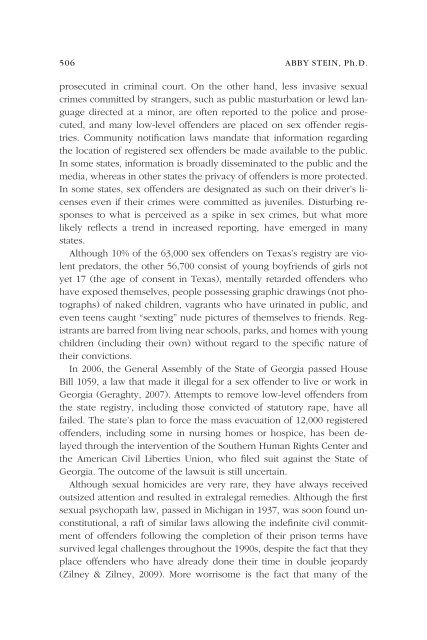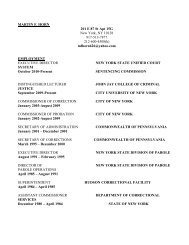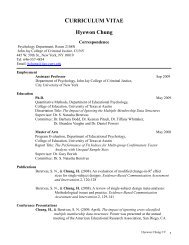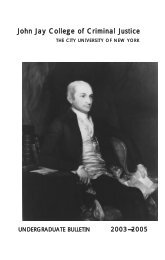The Sex MonSTer: - John Jay College Of Criminal Justice - CUNY
The Sex MonSTer: - John Jay College Of Criminal Justice - CUNY
The Sex MonSTer: - John Jay College Of Criminal Justice - CUNY
You also want an ePaper? Increase the reach of your titles
YUMPU automatically turns print PDFs into web optimized ePapers that Google loves.
506 Abby stein, ph.d.<br />
prosecuted in criminal court. On the other hand, less invasive sexual<br />
crimes committed by strangers, such as public masturbation or lewd language<br />
directed at a minor, are often reported to the police and prosecuted,<br />
and many low-level offenders are placed on sex offender registries.<br />
Community notification laws mandate that information regarding<br />
the location of registered sex offenders be made available to the public.<br />
In some states, information is broadly disseminated to the public and the<br />
media, whereas in other states the privacy of offenders is more protected.<br />
In some states, sex offenders are designated as such on their driver’s licenses<br />
even if their crimes were committed as juveniles. Disturbing responses<br />
to what is perceived as a spike in sex crimes, but what more<br />
likely reflects a trend in increased reporting, have emerged in many<br />
states.<br />
Although 10% of the 63,000 sex offenders on Texas’s registry are violent<br />
predators, the other 56,700 consist of young boyfriends of girls not<br />
yet 17 (the age of consent in Texas), mentally retarded offenders who<br />
have exposed themselves, people possessing graphic drawings (not photographs)<br />
of naked children, vagrants who have urinated in public, and<br />
even teens caught “sexting” nude pictures of themselves to friends. Registrants<br />
are barred from living near schools, parks, and homes with young<br />
children (including their own) without regard to the specific nature of<br />
their convictions.<br />
In 2006, the General Assembly of the State of Georgia passed House<br />
Bill 1059, a law that made it illegal for a sex offender to live or work in<br />
Georgia (Geraghty, 2007). Attempts to remove low-level offenders from<br />
the state registry, including those convicted of statutory rape, have all<br />
failed. <strong>The</strong> state’s plan to force the mass evacuation of 12,000 registered<br />
offenders, including some in nursing homes or hospice, has been delayed<br />
through the intervention of the Southern Human Rights Center and<br />
the American Civil Liberties Union, who filed suit against the State of<br />
Georgia. <strong>The</strong> outcome of the lawsuit is still uncertain.<br />
Although sexual homicides are very rare, they have always received<br />
outsized attention and resulted in extralegal remedies. Although the first<br />
sexual psychopath law, passed in Michigan in 1937, was soon found unconstitutional,<br />
a raft of similar laws allowing the indefinite civil commitment<br />
of offenders following the completion of their prison terms have<br />
survived legal challenges throughout the 1990s, despite the fact that they<br />
place offenders who have already done their time in double jeopardy<br />
(Zilney & Zilney, 2009). More worrisome is the fact that many of the<br />
04 CP47(4) 497-518.indd 506 10/6/2011 11:16:33 AM

















